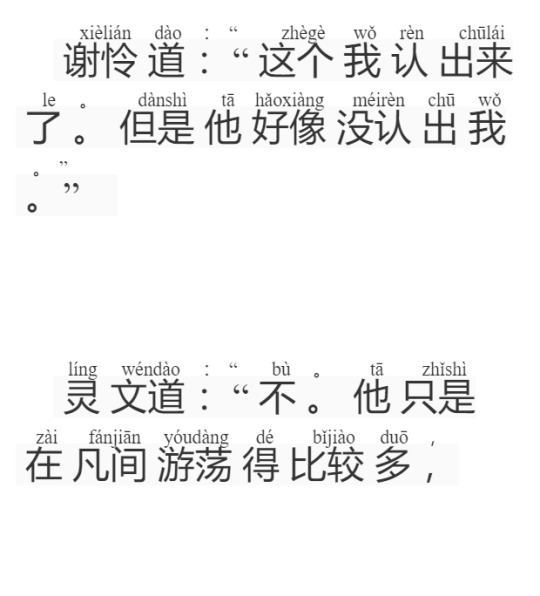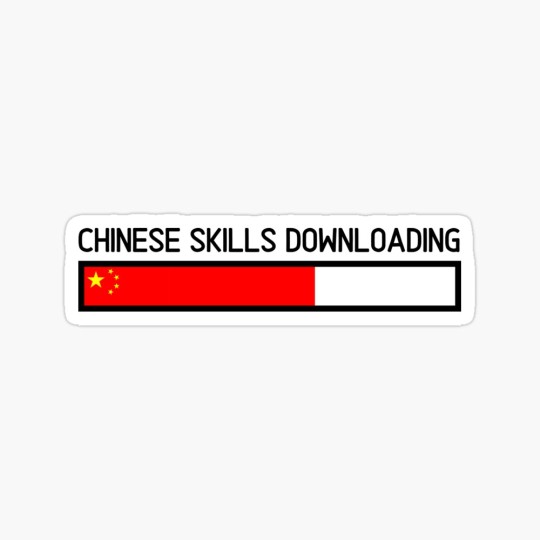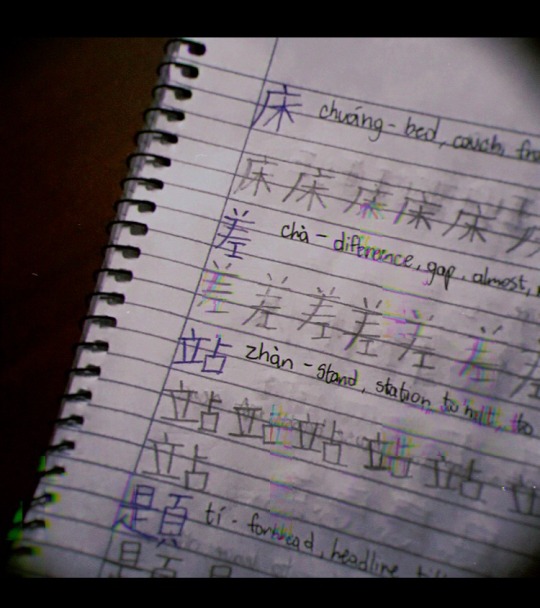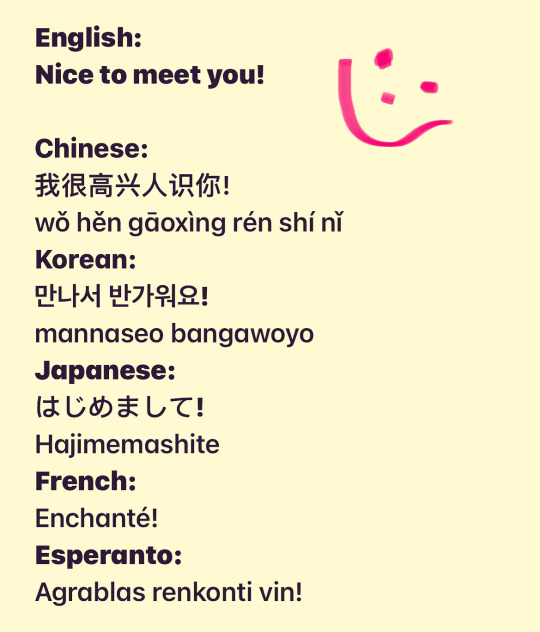#chinese learning
Text
今天的成语 An Idiom I Learned Today
recently learned about a new idiom and thought i would share! not sure if it counts as a 成语 per se, since it is 8 characters instead of 4. nonetheless here it is.
三天打鱼,两天晒网
sān tiān dǎ yú, liǎng tiān shài wǎng
literally: fish for 3 days, sun-dry the net for 2 days
figuratively: to lack perseverance; to not earnestly work toward something
example:
你要是三天打鱼两天晒网,那你永远不会进步。
If you "fish for 3 days but sun-dry the next for 2," then you won't ever improve.
it's the idea that if you work towards something for 3 days but then rest for 2, you're basically wasting your time and not putting in as much effort as you could—since you could be putting that effort in all 5 days.
it's definitely a very chinese concept 😅 i'm pro resting myself LOL
#chinese langblr#mandarin langblr#chinese learning#chinese#langblr#mandarin chinese#language learning#mandarin#learning languages#成语#chengyu#idioms#vocab#zhuzhu rambles
137 notes
·
View notes
Note
What are those apps you usually post in your productivity updates?
hi! here's a breakdown of apps i use, as well as websites and other resources i've used/use for my learning (mainly chinese, though some of these resources can be used for other languages as well).
apps i use every day:
dot languages: this is a chinese-specific app where you select your hsk level, and then read articles at that level. there's a pop-up dictionary, an option to show pinyin, post-article vocab practice (audio, matching, translation, and writing), and the option to have your articles either in simplified or traditional.
TOFU learn: a blend between flashcards and writing, you can find decks for various things, including hsk level-specific decks, and you learn new vocab with the stroke order and then write each new term three times—once with an overlay (so the term is visible), and then two times from memory. there's also a review function, which helps you practice terms you've already learnt, and each term has audio that goes with it. i use it for chinese, but there's decks for esperanto, french, german, italian, japanese, korean, norweigian, portuguese, russian, spanish, swedish, and turkish.
the pleco dictionary app: my favourite chinese dictionary app; allows you to translate from english to chinese or chinese to english, has options for writing, radical, vocal, and keyboard entry, and has both traditional and simplified characters.
ankiapp: this one's not particularly complicated; it's a flashcard app, where you can make your own decks or download decks other people have made. it uses a spaced repetition system to help you remember terms—you rate yourself from worst to best on how well you remembered the term, and that determines how many times it'll pop up afterwards. it also gives you an overall grade for each deck, which is a nice way to measure your progress.
duolingo: probably my least favourite of all of the apps i use; the chinese course isn't the best, and now that they've removed the notes/grammar information option, there's no way for people who aren't already fairly familiar with the language and its inner workings to learn them if they exclusively use duolingo. it's okay for maintenance practice, though, but i'm already almost finished with the entire course and i would say it barely reaches to lower hsk 4, so i wouldn't say it's a good tool if you're more advanced.
apps i have but use less often:
readibu: this is sort of like dot in that it's an app for reading in chinese with a pop-up dictionary. however, that's where the similarities end; readibu has novels, short stories, and articles aimed at children, and each of those are further split into genres. readibu also lets you add your own web-pages and read them on the app, so you can use its pop-up dictionary with them. it's aimed more to intermediate and upper intermediate learners, with hsk levels ranging from hsk 4 to hsk 6. the only reason i rate dot above readibu is because dot has a larger range of levels (hsk 1 through hsk 6 i believe? but it may go higher) and exercises built in to help you learn the vocab.
the chairman's bao: also a chinese reading app, though if you use the free version, you only get one sample article per hsk level (hsk 1 - hsk 6). i believe that every so often you get a new sample article for each level, but i'm not sure what the interval on that is. it also has a pop-up dictionary and a flashcard option for saved vocab.
du chinese: another chinese reading app; it has articles divided into newbie through master (six levels in total, though they don't line up perfectly with the hsk in my experience), and new articles are free for a certain period of time before becoming locked behind a paywall. there's a pop-up dictionary and a vocab review/test option for vocab you save.
memrise: flashcards with audio, depending on whether you're using an official course or a user-generated deck. decent, but it can get repetitive.
hellotalk: not exclusively chinese, but i believe it started off mainly aimed that way. you set your language, and then your target language, and then you can talk to native speakers who have your language as their target language. potentially incredibly useful, but if you're like me and extremely introverted you may have a hard time using this app, since it requires a lot of one-on-one interaction.
slowly: i haven't actually gotten around to using this, but it's sort of like a digital penpal app, as i understand it. you can learn more about it here.
websites and other miscellanea:
this massive mega drive by @salvadorbonaparte (languages, linguistics, translation studies, and more).
this masterpost by @loveletter2you (linguistics, languages, and language learning books/textbooks).
this masterpost on chinese minority literature by @zaobitouguang
the integrated chinese textbooks by cheng and tsui, which are the textbooks i use for self-study—there's textbooks and workbooks, as well as character workbooks (though these can easily be cut out without suffering from the loss).
mandarinbean: graded readers, hsk 1 - hsk 6, with a pop-up dictionary and the option to read in traditional or simplified
chinese reading practice: reading, beginner through advanced (three levels), with a pop-up dictionary and some additional notes included on vocab and language-specific things non-native speakers might struggle with or not know.
hsk reading: graded readers, hsk 1 - hsk 6, divided into three sections (beginner, intermediate, advanced). does not have a pop-up dictionary, but does have an option to translate the text, post-reading quizzes, and notes on important vocab with example sentences.
my chinese reading: reading from beginner to advanced (four levels); has a pop-up dictionary, the option to play an audio recording of the passage you're reading, notes on key words, things that are difficult to translate, grammar, and post-reading comprehension questions.
the heavenly path notion website, which i would say is one of the best resources i've ever found, with a massive number of guides, lists of chinese media in a variety of forms, and general resources.
chinese character stroke order dictionary: what it says on the tin; will show you the stroke order for a given character.
hanzigrids: allows you to generate your own character worksheets. i use this very frequently, and can recommend it. the only downside is if you want to create multiple pages at once, you have to pay; however this can easily be circumnavigated by creating only one sheet at a time. you can download the sheet as a pdf and print it out for personal use.
21st century chinese poety: a resource i only came across recently; has a massive collection of contemporary chinese poetry, including translations; much more approachable than classical poetry, which can often be incredibly dense and hard to parse due to the writing style.
zhongwen pop-up dictionary: if you're reading something in chinese on a website that doesn't have a pop-up dictionary, this is a must. i've never encountered any words that it doesn't have a translation for so far, including colloquialisms/slang. i use it to read webnovels, and it's been a fantastic tool. you can also save vocab by hitting the r key when you're hovering over a word/phrase, making it easy to go back and add terms to your flashcard deck(s).
chinese reading world: a website put together by the university of iowa; split into three levels (beginner, intermediate, and advanced), with thirty units per level, and ten modules per unit, as well as multiple proficiency tests per level. each module is split into three parts: a pre-reading vocab quiz, the reading with a number of comprehension questions based on it, and a post-vocab reading quiz. it also rates you in relation to someone with a native proficiency based on how quickly you read and answer the comprehension questions, and how many vocab questions you get right.
jiaoyu baike: an extensive chinese-to-chinese dictionary, put out by the taiwanese ministry of education. you can find an extensive write-up on it here, by @linghxr.
social media etc: see this post by @rongzhi.
qianpian: another chinese-to-chinese dictionary; @ruhua-langblr has a write-up on it here.
this writeup on zero to hero by @meichenxi; initially aimed at chinese learning, but now has expanded greatly.
music rec's: this masterpost by @linghxr.
tv/film: youtube is a great place to find chinese tv shows and films, and they often have english subtitles. if you can't find something on there, though, you can probably find it either on iqiyi or asianvote, which have both chinese and other asian shows and films (though you'll want an adblock if you're going to use the latter). i use these a lot to watch things, and have discovered a lot of media through these, and then novels through those when i went searching to see what they were adapted from.
polylogger: a website for logging the amount of time/type of language study you do. has a wide variety of languages, and the option to follow other people. still, it's a fairly basic site.
#chinese langblr#chinese language#chinese learning#langblr#chinese#mandarin#langblr resources#resources#汉语#indigostudies#inbox#indigo ink
287 notes
·
View notes
Text
Chinese Verbs Cheat sheet: E's
My quick guide to some common E- verbs in Chinese!
Eat - 吃 - chī
Educate - 教育 - jiàoyù (this ones a bit formal)
Empty - 清空 - qīngkōng
Ensure - 确保 - quèbǎo
Enter - 进入 - jìnrù
Encourage - 鼓励 - gǔlì
End - 结束 - jiéshù
Enjoy - 享受 - xiǎngshòu
Estimate - 估计 - gūjì
Evaluate - 评价 - píngjià
Examine - 检查 - jiǎnchá
Excel - 出色 - chūsè
Exceed - 超出 - chāochū
Exchange - 交换 - jiāohuàn
Exercise - 锻炼 - duànliàn
Exist - 存在 - cúnzài
Expect - 期望 - qīwàng
Experience - 经历 - jīnglì
Explain - 解释 - jiěshì
Explore - 探索 - tànsuǒ
#studyblr#langblr#chinese verbs#chinese langblr#study blog#college life#student life#aesthetic#study motivation#chinese language#mandarin langblr#mandarin#slavic roots western mind#college#travel blog#student#learn chinese#chinese#chinese learning#chinese culture
145 notes
·
View notes
Text
Took me four hours but I was able to convert and format a Mandarin epub to include pinyin notation above the text:

Technical details below for anyone interested
I was trying to do this on my personal laptop, which is, unfortunately, Windows. I found two GitHub projects that looked promising: pinyin2epub and epub-with-pinyin and spent most of my time trying to get python to work. I wasn't able to get the second project to work, but I was eventually able to get some output with the pinyin2epub project.
The output was super messy though, with each word appearing on a different line. The script output the new ePub where all the tags that encapsulated every word and pinyin were on a new line, as well as having a ton of extra spacing.
I downloaded Calibre and edited the epub. With the help of regex search and replace I was able to adjust the formatting to what is shown in the picture above.
All in all, I'm fairly happy with it although it does fail to load correctly in any mobile ePub reader I've tried so far ( I have an Android). I think it's the <ruby> tags are either unsupported or cause a processing error entirely depending on the app.
Once I have motivation again I'd love to try to combine the original text epub with a translated epub. My idea here is that there would be a line of the original text above followed by a line of the translate text so on and so forth. I'd probably need to script something for this, maybe it could look for paragraph tags and alternate from two input files. I'd have to think about it a bit more though.
Unfortunately my Mandarin isn't yet strong enough to read the novels I'm interested in entirely in the original language, but I'd love to be able to quickly reference the original text to see what word or character they used, or how a phrase is composed
Feel free to ask if you want to try to do this and need any clarification. The crappy screenshot and lack of links because I'm on my phone and lazy.
105 notes
·
View notes
Text
the chinese spam texts i get -> free reading practice

transcipt + translation:
Hi! Anna, 你近期要来 San Francisco
Hi! Anna, you're coming to San Francisco soon
出差一段时间,
on a business trip for a while
什么时候出发呢?
When are you setting off?
vocabulary + notes below:
近期 (jìn qí) can mean soon OR recently--the word itself doesn't specify past or future. tread carefully and consider the context!
出差 (chū chāi) just means business trip
San Francisco in chinese is 旧金山 (jiù jīng shān) or 三番 (sān fān)
三番 is casual (slang?), while 旧金山 is the official (and i think ~cooler~) name
#mandarin langblr#chinese langblr#mandarin chinese#chinese learning#owel's spam texts#intermediate level stuff#trying something new here#is the color-coding helpful or distracting?
88 notes
·
View notes
Text




I've got some stickers (and other products) relating to language-learning that you can get from my Redbubble
Languages available include: Chinese, Danish, Dutch, English, Finnish, French, German, Greek, Hindi, Irish, Italian, Japanese, Korean, Latin, Norwegian, Portuguese, Slovenian, Spanish, Swedish, Russian and Turkish
#langblr#language learning#languages#learning languages#foreign languages#language study#german#german language#german langblr#german learning#latin language#latin langblr#chinese#chinese langblr#chinese language#chinese learning#italian language#italian langblr#studyblr#lingua latina
22 notes
·
View notes
Text
.🥜 today I learned
Punching the guy in the nuts was part of Sun Wukong’s method of defeating his first enemy. This was not in the Antony Yu translation 😔, so I thought I might share
First enemy being the giant yaoguai who kidnapped a bunch of his monkeys while swk was away learning Daoist arts.
The specific words used were 撞了裆.
撞 as in dealt a blow to
了 indicates it’s done
裆 as in the space between two legs
Wow, l’m learning Chinese! It’s for the sake of language learning, not for the 🥜 jokes.
What’s funnier is when Sun Wukong rips off fur to transform into 300 monkeys, and then the monkeys started employing the same tactic. Specifically “钻裆的钻裆”
钻 as in bore, dig into
what the heck
111 notes
·
View notes
Text



2.12.23
just chillin today, exams coming up so study guides are inevitable.
#chinese learning#langblr#lingblr#language learning#diary#diary blog#moodboard#chaotic academia#daily life#student life#studyblr#study motivation#my stuff#studying
22 notes
·
View notes
Text
Mandarin learning material recommendations:
My favorite Mandarin dictionaries:
—
MDBG
I’m not even gonna try listing all of the features because there’s just so many and I’ve used it for many years now and on a daily basis. Not to mention it is constantly updated. In terms of features and overall quality, MDBG is the best in my opinion.
MandarinSpot’s Annotator
Sometimes has slightly different definitions compared to MDBG, and someone it will have the definition for words that MDBG does not have entered yet. Also, it helpful for anyone who reads Chinese best horizontally as opposed to listed vertically like on MDBG.
Pleco (app)
Most similar to MDBG, but for your smart phone.
—
Important Note:
Please keep in mind that none of these dictionaries are perfect and language is constantly evolving, so new terms are not likely to be in any of these dictionaries.  there is not many moderators for these dictionaries so sometimes definitions and words won’t be entered in for weeks or even months.
If you find yourself with some thing that is clearly a word but does not have an English definition entered into either of these dictionaries it works best to look up the definition in Chinese on Baidu Dict or Google, or even check out Wikitionary/Wikipedia. 
—
PLEASE COMMISSION ME I BEG YOU
#chinese langblr#mandarin langblr#learn chinese#chinese lesson#chinese vocab#chinese to english#language learning#chinese language#language learning recommendation#language resource#language learning resources#language resources#mandarin learning#mandarin to english#study mandarin#learn mandarin#MDBG#study chinese#chinese learning#language learning material#study material
41 notes
·
View notes
Text
Phrase of the day:

#chinese learning#korean language#japanese language#french language#esperanto#french#chinese#korean#japanese#polyglot#learning languages
50 notes
·
View notes
Text
Learning Chinese from Spam Texts
I got a very amusing spam text in Chinese this morning, so naturally I have to turn it into a vocabulary lesson.
生活洋溢甜蜜温馨,周末愉快,今天有什么安排呢?
看你没有回信息,你是在忙还是没有收到我的信息呢?
新词 Vocab:
洋溢 / yáng yì / brimming with
甜蜜 / tián mì / sweet
温馨 / wēn xīn / soft, fragrant and warm
愉快 / yú kuài / happy, pleasant, cheery
安排 / ān pái / plan or arrangements; to plan or arrange
信息 / xìn xī / text message; information
收到 / shòu dào / to receive
翻译 Translation:
Life is brimming with sweetness and warmth, happy weekend, what plans do you have today?
I see you haven't replied to my message, are you busy or have you not received my message?
#chinese langblr#mandarin langblr#chinese learning#chinese#langblr#mandarin chinese#language learning#mandarin#learning languages#vocab#spam text#spam#垃圾信息#cackling at this message tbh#really threw me off
129 notes
·
View notes
Text
Here’s a fun phrase I learned:
我救了你的狗命
wǒ jiùle nǐ de gǒu mìng
Literally: “I saved your dog life.”
This is something you can say to a friend if you help them out and you want to make fun of them a little. “Dog life” is playfully derogatory in this context. “I saved your useless life” Implies that the person you saved should be very grateful to you.
I first saw it used in a cdrama called Find Yourself when one character gives another character an item that helps them get out of a lie. I used it when I found my roommate’s keys the day we moved out, saving her from a fine, lol.

#chinese#learning mandarin#chinese language#chinese learning#chinese langblr#mandarin langblr#mandarin studyblr#learning chinese
204 notes
·
View notes
Text
Chinese Verbs Cheat sheet: G's
A quick guide to some common G-verbs in Chinese!
Gain - 获得 - Huòdé
Gather - 收集- Shōují
Generate - 产生 - Chǎnshēng
Get - 拿到 - Ná dào
Get up - 起床 - Qǐchuáng
Give - 给 - Gěi
Give in - 让步 - Ràngbù
Give up - 放弃 - Fàngqì
Glare - 眩光 - Xuànguāng
Glow - 发光 - Fāguāng
Go - 去 - Qù
Go back - 回去 - Huíqù
Govern - 执政 - Zhízhèng
Grab - 抓住 - Zhuā zhù
Graduate - 毕业 - Bìyè
Greet - 打招呼 - Dǎzhāohū
Grieve - 悲伤 - Bēishāng
Grow - 成长 - Chéngzhǎng
Grumble - 发牢骚 - Fāláosāo
Guard - 守护 - Shǒuhù
Guess - 猜 - Cāi
Guide - 指导 - Zhǐdǎo
#studyblr#langblr#chinese verbs#chinese langblr#study blog#college life#student life#aesthetic#study motivation#chinese language#mandarin langblr#mandarin#slavic roots western mind#college#travel blog#student#learn chinese#chinese#chinese learning#chinese culture#vocabulary#verbs
98 notes
·
View notes
Text
i’m not sure if anyone else is aware of this yet—i just found out today—but dot languages has started restricting the amount of articles you can read (per week i believe?) without a subscription. personally, i think the 11USD/month fee is worth it for how frequently i use the app and how useful it is to me, but i know that not everyone can afford that (about ~130USD/year) cost, and as someone who has frequently recommended the app and spoken positively of it as a great free tool for improving your chinese, i think it’s important that i make a post letting people know about this change.
#chinese#chinese learning#chinese langblr#chinese language#mandarin langblr#langblr resources#this is genuinely frustrating because free graded reader apps are absurdly hard to find for chinese#i guess it makes sense; it’s a business after all#i just wish it wasn’t necessary#indigo ink
19 notes
·
View notes
Text
new week, new spam

translation + transcript:
陈医生,你现在在店里吗?
Doctor Chen, are you in the shop right now?
我的宠物看起来有点不舒服。
My pet looks like it's feeling a little bad.
vocabulary + notes:
陈 (chén) is a common surname, but i get tripped up by the fact that it looks like 东 >:(
宠物 (chǒng wù) just means pet. dunno why they didn't say 猫 or 狗 though
不舒服 (bú shū fú) can be discomfort and or pain. like when your tummy hurty that's 肚子不舒服
69 notes
·
View notes
Text
Language learning with media tips and recs for Mandarin
Once you've started to approach conversational level (or before then if you can't wait) a great way to build familiarity is watching shows in the language you are learning. But if you are still fairly new to the language there can still be a big gaps here, so I am sharing what's worked for me.
General tips
If you haven't already, I highly recommend adding two plugins to your browser: a speed controller and a dual subtitle plugin.
A speed controller is great for slowing it down when they are speaking too fast to process.
And while it's not great (for language learning purposes) to rely on native language subtitles, it's one way to enjoy watching a target language show and not have to engage so much of your brain (work and life can be draining) while still getting some benefit via exposure to culture, the sounds and (with a dual sub plugin) the words.
I use Chrome (yuck, I know) and the plugins DualSub and Video Speed Controller . There may be better ones out there, but I enjoy these. Dual Sub also has a " Chinese learning" option, which adds the pinyin as well, but I find it's not super reliable, not sure what I am doing wrong.
Also, side note: use Netflix in the browser for dual sub, if they have the subtitles you want.
Mandarin targeted tips
Watching shows produced in your target language is great practice but it can be hard to find sometimes, or expensive. The two best free options are YouTube and Viki, which come with their own pros and cons.
Youtube
Pros
If you search any show you want with "English subtitles" you are likely to find it
Accessible to anyone, I don't think anyone is unfamiliar with youtube
Cons
Grainy crunchy quality as expected
Subtitles are often in the video instead of as a subtitle file, so they are often also poor quality
You may or may not find a video with Chinese (simplified or traditional) subs as well
Rakuten Viki
Pros
Extensive collection of shows in mandarin
Chat function
Cons
Don't always have Chinese subtitles
With free version, ad breaks can sometimes be a lot
Chat function
Honestly I like the Viki chat, which is timed comments that you can toggle on or off, but as with any chat functionality, the comments vary wildly and can get a little unhinged (whether that's a pro or con is in the eye of the beholder).
Show Recs
Ok now the real reason for this post: an excuse to gush about my favorite shows lol.
The Untamed
Probably needs no introduction, but as my first cdrama it will always hold a special space in my heart.
Sales pitch: a very fun cast of characters with acting I really enjoyed (but sometimes on the cheesy side) and motivations I could understand, even if I disagreed with them. I don't think I truly hate any character in this show, even the annoying ones I enjoy mocking at least.
Vibes: epic historical fantasy drama with humor and angst and tragedy
Disclaimers: not everyone enjoys the acting as much as I did, many people dislike the deviations from the source material (including the censorship), regular drama pitfalls (pacing, cheesiness, etc)
Where to watch: Available on US Netflix or on Viki (although low quality unless you have a paid subscription)
My Uncanny Destiny
My favorite drama to date.
Sales pitch: an extremely funny satirical take on cdrama tropes, I laughed through pretty much all of it. Has very progressive themes for the setting and handles them well (but humorously). The main couple's dynamic was fantastic.
Vibes: comedic historical drama with depth
Disclaimers: I personally think it is a lot funnier if you are at least passingly familiar with cdrama tropes as the premise of the show relies on flipping these (esp gendered ones), a fair amount of potty/gross out humor (but not all of it), the writing does drop off a little towards the end
Where to watch: viki
God Troubles Me
For the animation fans
Sales pitch: an animated show that is also really great for learning more about modern Chinese culture, I love the light hearted humor and ridiculous characters in this. While there is a loose overarching plot dealing with gods and monsters, it's actually very much a slice of life show
Vibes: cozy fun comedy
Disclaimers: while it's a great way to learn about Chinese culture, that can also be one of the biggest hurdles to engaging with it, especially if you are not very knowledgeable yet (like me!). Because it assumes the audience is already familiar, some jokes/details/plots may be confusing.
Where to watch: US Netflix.
#the untamed#my uncanny destiny#god troubles me#language learning#mandarin learning#chinese learning#language learning tools
16 notes
·
View notes